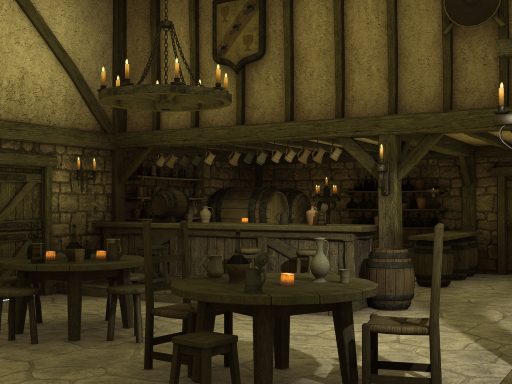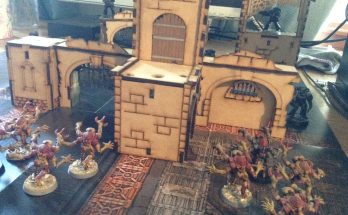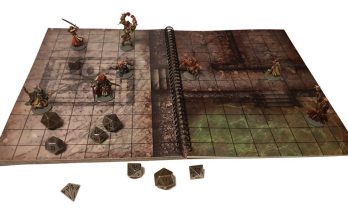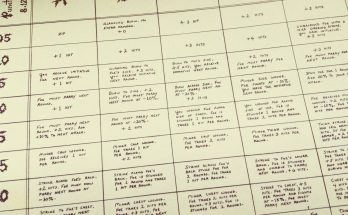What do adventurers do when they’re not stabbing things with the pointy end? That’s the question we are going to be answering today as a part of our week-long look into Basic D&D.
Generally speaking your typical adventuring party is in one of two possible binary states: killing something, or on their way to kill something. That’s a bit of a shame as role-playing games offer so much more potential than either of those things, and every edition of D&D (yes, even Fourth Edition if you know where to look) provide the rules and guidance to cover many other possible activities. Basic D&D is no exception, and offers surprising breadth in its out-of combat coverage.
The general, though oft ignored, rule is that PCs are expected to pay their way. There’s a whole selection of Lifestyle Expense options from Wretched (free!) to Aristocratic (10gp or more per day), depending where along the social ladder your character feels most comfortable. This choice opens up a whole raft (not that opening up a raft is ever a good idea) of social interaction options in the game. Does the entire party go full on Aristocratic after their last dungeon crawl and burn through piles of cash, gaining important and useful high-up contacts (and possibly enemies) along the way? Or to they split up and go their own separate ways, the Cleric opting for a Modest living while the Wizard hobnobs with the Wealthy Elite? This one simple selection from a table can open up a whole vista of adventure hooks. Don’t ignore Lifestyle folks! It’s the stuff what new adventures are made of.
The PCs are free to dip into a touch of luxury once in a while too, perhaps staying a night at the best quality Inn in town to soak their weary feet and catch up with their mysterious masked benefactor. Lifestyle Expenses includes the cost of board and lodging but it’s fair to say any out-of-town overnight accommodation has to be paid for separately. The GM has to find a way to make the PCs part with their cash, right?

It’s important not to ignore the cunning use of hirelings too. A smart party will hire two porters to carry their equipment and loot, five mercenaries and a cartographer before they enter a dungeon or dangerous wilderness. That’s a total cost of 12gp 4sp per day, and money well spent. The GM will hate you for it, but you never know when one of those NPCs will become your next PC when the current fails all those Death Saves. It’s like bringing a complete set of Extra Lives with you for the journey.
When travelling en-route to adventure, Basic D&D suggests a number of activities the party can carry out, alongside the necessary eating, drinking and sleeping. They can Navigate, Draw a Map, Track and Forage. Disappointingly, most of these options refer to the DMG for further details. I hope full rules will be in the free download when that’s released, but it’s not hard to make up your own for now. Most of these activities require a Wisdom (Survival) check, so it’s well worth at least one party member being Proficient in that skill. If not, hire a Skilled Hunter to tag along and keep you alive.
These are far from your only options of course – role-playing is about imagination and that requires no rules to use. Your Fighter could be fletching new arrows, Wizard researching new spells while on horseback and the Cleric doing whatever it is that Clerics do when no one is looking. Best not to ask.
An important rule in this edition of D&D regards resting. Unlike Fourth Edition, a Short Rest isn’t all that short – it’s at least 1 hour long, more analogous to a full lunch break rather than a nice 15 minute sit on a park bench. It necessitates finding somewhere safe and relatively comfortable, perhaps setting up a small campfire to brew some tea and eating some food. It isn’t something to be carried out lightly when deep in enemy territory where the risk of a nasty random encounter (rolled on the Nasty Random Encounter Table, of course) could result in you having fewer hit points than when you started.
At the end of the heroes’ lunch break, they regain however many Hit Dice (+ CON bonus) they want, up to their level. This acts as a pool that replenishes after every Long Rest, and operates as a kind of exhaustion mechanic in the game. At the start of the day a 4th Level Fighter, for example, will be at full Hit Points and have a Hit Dice pool of 4d10. After a brief battle against Bugbears the party stop to rest and he uses 1d10 of those Hit Dice as he cleans up the cuts and bruises. Later the party is ambushed and the Fighter is badly wounded in the fight. The heroes hole themselves up behind a barricade, and the Fighter uses the remaining 3d10 Hit Dice to recover, binding his wounds and chewing a few herbs to numb the pain. Physically he can carry on, but he’s aware that he can’t take another beating like that today. He needs sleep to regain his energy. Perhaps around the next bend there’s a safe room with a sturdy door……..
This is a mechanic which should be familiar with Fourth Edition players, and it’s a welcome to this edition too in my book. It’s particularly well suited to mega-dungeon style games where finding a safe place to rest is vital, especially as potions and magical healing might well be on short supply. This ‘wulf approves.
Many of the skills in Basic D&D are designed for use outside combat with Investigation perhaps being at the top of that list. I’m not a huge fan of the name of that skill – it puts me more in mind of Call of Cthulhu than D&D – but can’t think of a suitable mediaevally-flavoured alternative. Maybe they should have just stuck with Search.
The other skill which niggles is Medicine. As written all that it can do is stabilize a dying companion or diagnose an illness. I’d have hoped it could be used to heal even 1 hit point non-magically (1d4 on a natural 20), usable on the same individual no more than once every 8 hours, and requiring access to herbs and a healer’s kit to use. Rolling a natural 1 causes 1d4 hit points of damage. Medieval medicine is not without its dangers.
Tomorrow let’s take a look at combat. It’s time to roll them dice, folks.
Till then!



